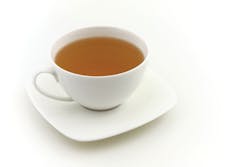IBISWorld has updated its tea production report and estimates that the Tea Production Industry will increase. “Despite falling unemployment and rising consumer confidence, IBISWorld estimates industry revenue will increase at an annualized rate of 1.9 percent in the five years, to 2013 to total $1.0 billion,” IBISWorld industry analyst Agata Kaczanowska said in a prepared statement. Revenue is expected to grow slowly over the period due to uncertainty abroad; however, exports will continue to generate a rising share of sales, accounting for about 31.7 percent of 2013 revenue.
Tea is also becoming more popular thanks to the increasing variety of flavors, strengths and sweeteners. The high differentiation of teas has enabled the industry's major players to earn high profit margins and perform well, despite recessive economic conditions. “The high brand recognition and customer loyalty that major players command have also contributed to high profit margins and sales growth,” Kaczanowska said. In particular, Unilever has the distinction of longevity with its Lipton brand. On the other hand, as members of a growth industry, niche players have had some significant opportunities to serve increasingly fragmented consumer needs, such as the specialty and gourmet segment. Consequently, establishments have grown during the period.
The top four players, Unilever Group, R.C. Bigelow, Hain Celestial Group and Tata Group, make up less than 80.0 percent of the Tea Production industry's revenue. This share has increased since 2008 although small, specialized tea producers sprouted up nationwide. Profitable opportunities exist for niche players within the Tea Production industry, especially in the gourmet and specialty tea segments. Niche players such as Rishi Tea, which specializes in wellness and exotic teas, have been steadily increasing their share of the market. The product lines of the major brands, including Lipton, Bigelow, Celestial Seasonings and Good Earth, typically comprise mid- to low-value, high-volume, branded products. Given the high brand value of these products, these players enjoy a high degree of loyalty and familiarity from their consumers. Smaller players tend to focus on niche markets, supplying specialty products that are of high value and margins but have shorter production runs and hence lower volumes.
The Tea Production industry's future is bright. America's aging population, which embraces tea's antiaging and health attributes, will be a strong source of future demand and will drive sales of specialty products, particularly for green and herbal teas (herbal tea does not contain tea plant leaves). In addition, emphasis on innovation and new product introductions will further stimulate demand in the next five years. IBISWorld projects that industry revenue will grow at in the five years to 2018. For more information, visit IBISWorld’s Tea Production in the US industry report page.





